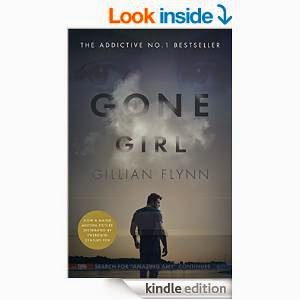 |
Gone Girl's Amy Dunne, played by
Rosamund Pike. |
Last week, I looked at the novel,
Gone Girl, by Gillian Flynn, from the perspective of
reading an unreliable narrator. I focused entirely on Nick Dunne though, and neglected the other main character, Amy Elliot Dunne, so I thought I owed her more page time. FYI: discussing any part of this book is in itself a
*spoiler alert* so reader beware!
To recap: the structure of
Gone Girl is a battle of dueling unreliable narrators. The chapters alternate between the point of view of a husband (Nick) and his wife (Amy), and both are unreliable because they omit, distort, and/or are incapable of accurately interpreting information. At the beginning of the book, we're led to believe that a wife has been murdered by her husband, and by the end, we find out that the wife has, in fact, only staged her murder in order to frame her husband.
Actually, I should probably correct myself and say that there are
three unreliable narrators--Nick and two versions of Amy. In the first part of the book (Boy Loses Girl), there is Diary Amy--Amy as presented in the pages of a diary that she creates and, later, plants as evidence against Nick. The other is the Real Amy--the one who has gotten away with staging her murder and framing Nick. For the purposes of this post, I'll deal with Diary Amy.
The challenge with Nick's character was to make a murder suspect compelling and charming enough for the reader to want to follow his side of the story. The challenge with Diary Amy is the opposite--she has to read convincingly enough as a victim and a heroine to keep the reader from guessing her more malignant role in this drama. Here's a rundown of how I think this works:
1. The brilliant device of the diary!
This one fact alone--that we think we are reading
diary pages--is enough to lure us into a false sense of intimacy and truthfulness, even though the self Amy presents in these pages is largely made up. After all, we might think, who lies in their diary?
The sense of time created by these diary entries is also significant--the entries are spontaneous, genuine, and most importantly, created
prior to Amy's disappearance--they presume no foreknowledge of future events, other than Amy's suspicions and worries. This is an important distinction, when compared to Nick's chapters, which are written
after Amy's disappearance, and automatically put him in the position of trying to explain what happened to his wife. That means, from the reader's point of view, Nick is under pressure to convince us (and himself) of his innocence from the beginning, while Diary Amy is automatically presumed innocent.
2. Amy's witty self-deflection
The very first paragraph of Amy's diary reads:
"Tra and la! I am smiling a big adopted-orphan smile as I write this. I am embarrassed at how happy I am, like some Technicolor comic of a teenage girl talking on the phone with my hair in a pony tail, the bubble above my head saying, I met a boy! (p10)"
The rest of the diary very much continues in this voice--the delicious mix of irony and earnestness of a reluctant yet head-over-heels woman in love. It's almost hard not to fall in love with her oneself--she's gushy and goo goo-eyed over Nick, but she's endlessly self-aware and self-deprecating about it: "I have become a wife, I have become a bore, I have been asked to forfeit my Independent Young Feminist card. (p38)" Against her best instincts, she has devoted her life to her man.
The result is an expert kind of self-deflection--the portrait of the kind of woman we should hate (and that, in fact, the Real Amy
does hate, as we'll find out later), the kind whose life begins and ends with her husband's--and yet we like her! She's just like us--she's smart and funny and, yes, complicated.
3. Nick destroys Amy's dewy-eyed dreams
Diary Amy's treatment of Nick is very cleverly done. He very rarely speaks in her pages--the good times of their relationship are described mostly in summary. However, when Nick does speak, he is hostile or withholding, and hoists himself with his own petard--all without Diary Amy having to pass judgment. This is crucial, since if she did, it would damage her credibility and likability to the reader. Instead, she focuses on scenes that emphasize Nick's tendency toward self-entitlement and passive-aggression. Here's one where he skips their anniversary dinner after his colleagues are laid off, in order to buy them drinks. He stays out all night and when he shows up the next day, Diary Amy greets him with a present to show no hard feelings:
"He sat down...and glanced at the present on the table and said nothing....He clearly wasn't going to even graze against an apology--hey, sorry things got screwy today. That's all I wanted, just a quick acknowledgment.
'Happy day after anniversary,' I start.
He sighs, a deep aggrieved moan. 'Amy, I've had the crappiest day every. Please don't lay a guilt trip on me on top of it....'
'I was just saying happy anniversary.'
'Happy anniversary, my asshole husband who neglected me on my big day.'
We sit silent for a minute, my stomach knotting. I don't want to be the bad guy here. I don't deserve that....(p67)"
Diary Amy comes across as making a good faith effort, while Nick reads like a self-involved jerk.
In short, Diary Amy is a brilliant construction of an unreliable narrator--one that reads just as compellingly
after the reader knows the novel's outcome, as before.















